University Essay: Nursing Profession Development and Societal Impact
VerifiedAdded on 2022/08/12
|8
|2096
|11
Essay
AI Summary
This essay provides a comprehensive overview of the nursing profession's evolution, examining its emergence, development, and societal impact. It begins by defining the duties of nurses and tracing the profession's origins, highlighting the influence of Florence Nightingale and the impact of epidemics. The essay then delves into relevant policies and legislation, such as the Health and Social Care Act 2012 and the NMC Code, and discusses how societal changes, including evolving definitions of health, have shaped nursing practices. It analyzes both the successes and downfalls of the profession, including nurse shortages and the importance of patient-centered care. The essay concludes with recommendations for addressing current challenges and improving the nursing profession.
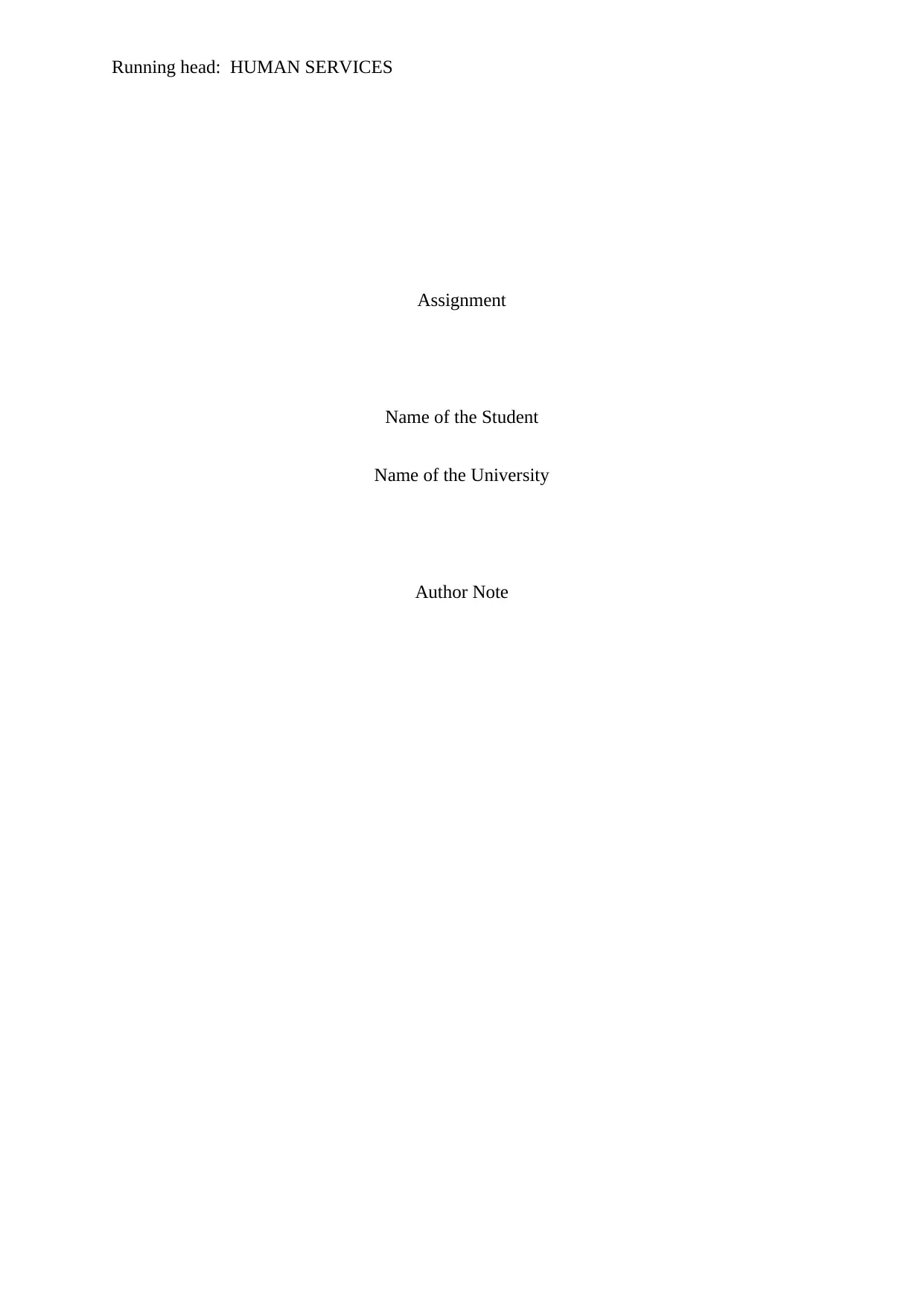
Running head: HUMAN SERVICES
Assignment
Name of the Student
Name of the University
Author Note
Assignment
Name of the Student
Name of the University
Author Note
Paraphrase This Document
Need a fresh take? Get an instant paraphrase of this document with our AI Paraphraser
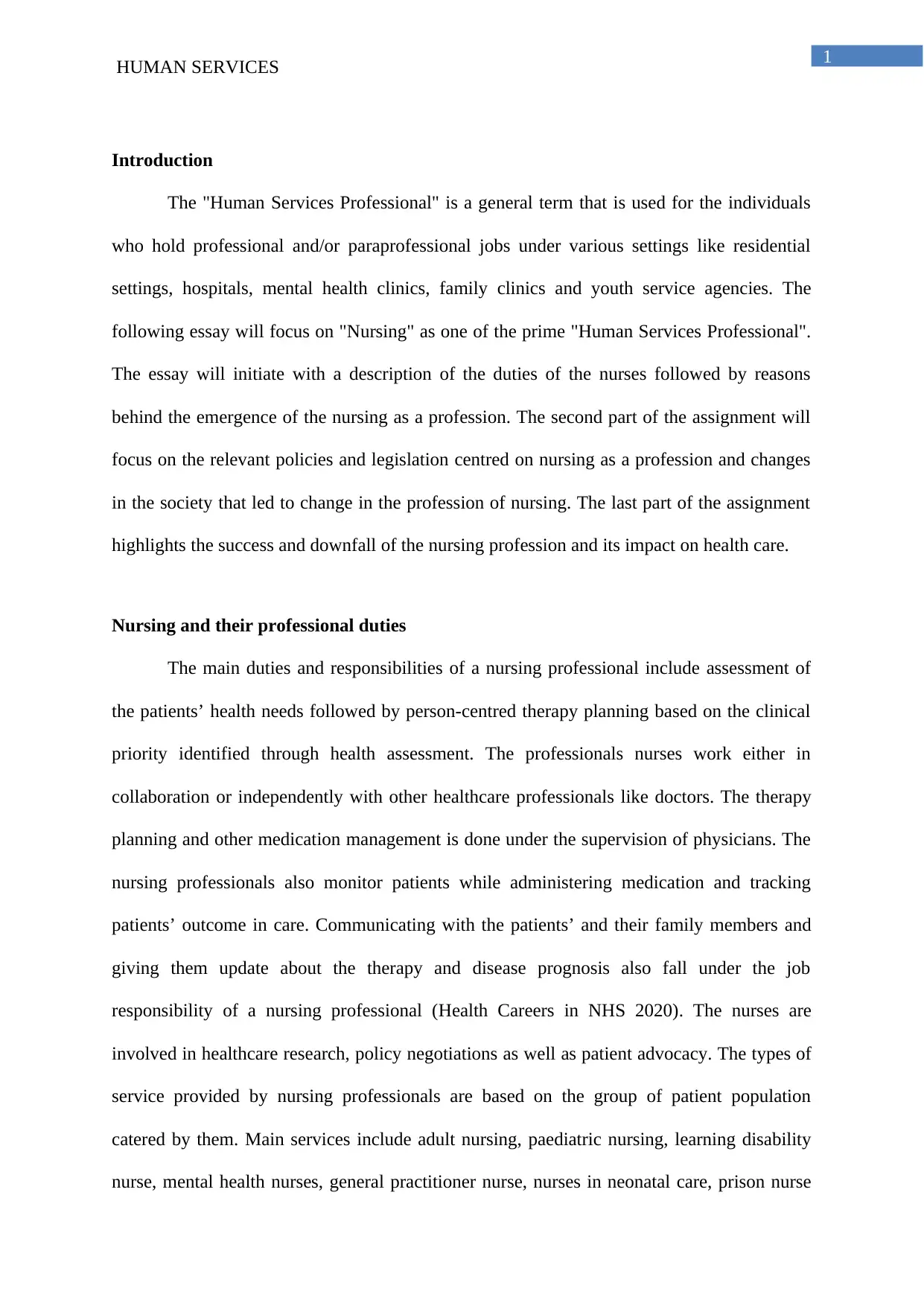
1
HUMAN SERVICES
Introduction
The "Human Services Professional" is a general term that is used for the individuals
who hold professional and/or paraprofessional jobs under various settings like residential
settings, hospitals, mental health clinics, family clinics and youth service agencies. The
following essay will focus on "Nursing" as one of the prime "Human Services Professional".
The essay will initiate with a description of the duties of the nurses followed by reasons
behind the emergence of the nursing as a profession. The second part of the assignment will
focus on the relevant policies and legislation centred on nursing as a profession and changes
in the society that led to change in the profession of nursing. The last part of the assignment
highlights the success and downfall of the nursing profession and its impact on health care.
Nursing and their professional duties
The main duties and responsibilities of a nursing professional include assessment of
the patients’ health needs followed by person-centred therapy planning based on the clinical
priority identified through health assessment. The professionals nurses work either in
collaboration or independently with other healthcare professionals like doctors. The therapy
planning and other medication management is done under the supervision of physicians. The
nursing professionals also monitor patients while administering medication and tracking
patients’ outcome in care. Communicating with the patients’ and their family members and
giving them update about the therapy and disease prognosis also fall under the job
responsibility of a nursing professional (Health Careers in NHS 2020). The nurses are
involved in healthcare research, policy negotiations as well as patient advocacy. The types of
service provided by nursing professionals are based on the group of patient population
catered by them. Main services include adult nursing, paediatric nursing, learning disability
nurse, mental health nurses, general practitioner nurse, nurses in neonatal care, prison nurse
HUMAN SERVICES
Introduction
The "Human Services Professional" is a general term that is used for the individuals
who hold professional and/or paraprofessional jobs under various settings like residential
settings, hospitals, mental health clinics, family clinics and youth service agencies. The
following essay will focus on "Nursing" as one of the prime "Human Services Professional".
The essay will initiate with a description of the duties of the nurses followed by reasons
behind the emergence of the nursing as a profession. The second part of the assignment will
focus on the relevant policies and legislation centred on nursing as a profession and changes
in the society that led to change in the profession of nursing. The last part of the assignment
highlights the success and downfall of the nursing profession and its impact on health care.
Nursing and their professional duties
The main duties and responsibilities of a nursing professional include assessment of
the patients’ health needs followed by person-centred therapy planning based on the clinical
priority identified through health assessment. The professionals nurses work either in
collaboration or independently with other healthcare professionals like doctors. The therapy
planning and other medication management is done under the supervision of physicians. The
nursing professionals also monitor patients while administering medication and tracking
patients’ outcome in care. Communicating with the patients’ and their family members and
giving them update about the therapy and disease prognosis also fall under the job
responsibility of a nursing professional (Health Careers in NHS 2020). The nurses are
involved in healthcare research, policy negotiations as well as patient advocacy. The types of
service provided by nursing professionals are based on the group of patient population
catered by them. Main services include adult nursing, paediatric nursing, learning disability
nurse, mental health nurses, general practitioner nurse, nurses in neonatal care, prison nurse
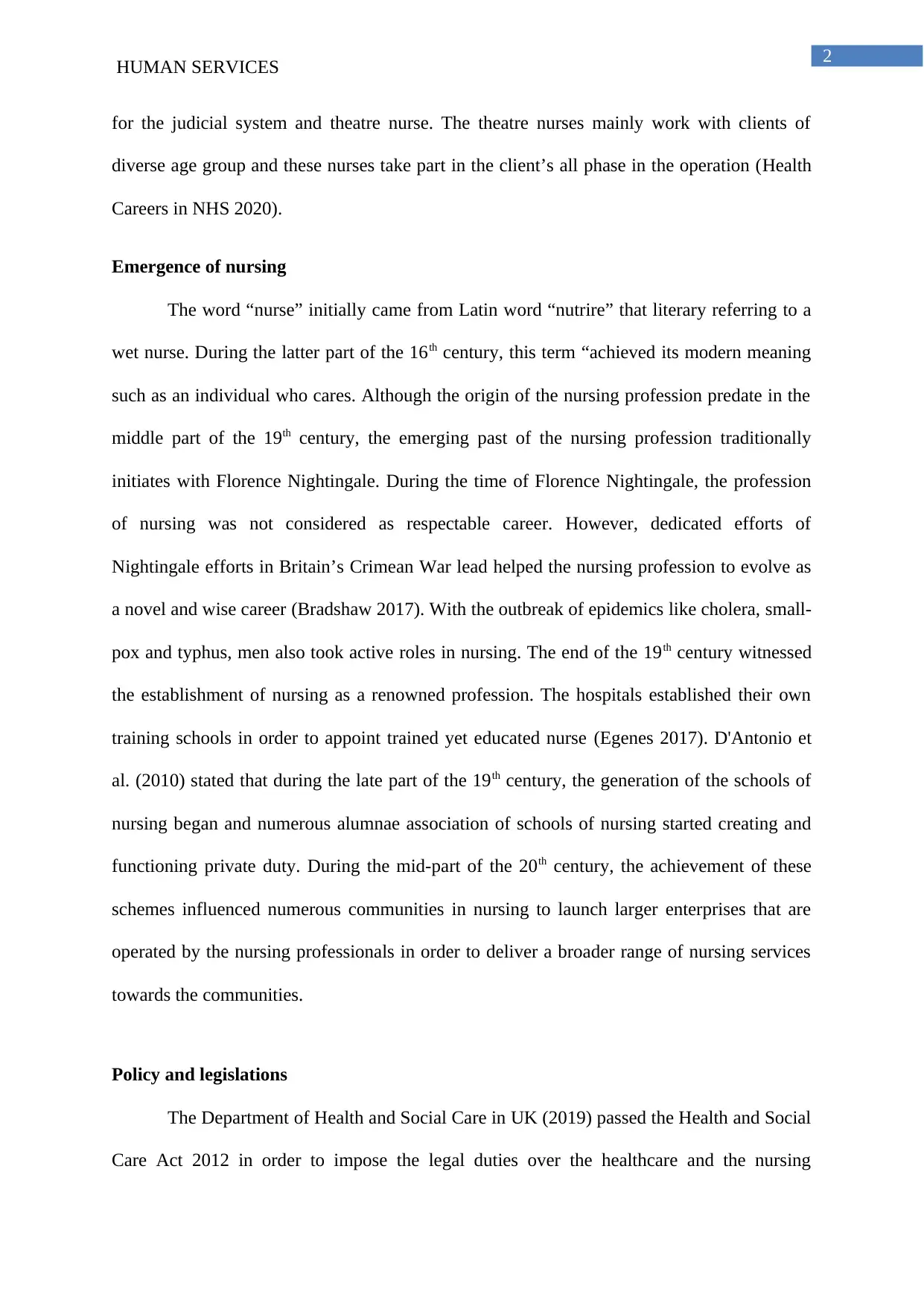
2
HUMAN SERVICES
for the judicial system and theatre nurse. The theatre nurses mainly work with clients of
diverse age group and these nurses take part in the client’s all phase in the operation (Health
Careers in NHS 2020).
Emergence of nursing
The word “nurse” initially came from Latin word “nutrire” that literary referring to a
wet nurse. During the latter part of the 16th century, this term “achieved its modern meaning
such as an individual who cares. Although the origin of the nursing profession predate in the
middle part of the 19th century, the emerging past of the nursing profession traditionally
initiates with Florence Nightingale. During the time of Florence Nightingale, the profession
of nursing was not considered as respectable career. However, dedicated efforts of
Nightingale efforts in Britain’s Crimean War lead helped the nursing profession to evolve as
a novel and wise career (Bradshaw 2017). With the outbreak of epidemics like cholera, small-
pox and typhus, men also took active roles in nursing. The end of the 19th century witnessed
the establishment of nursing as a renowned profession. The hospitals established their own
training schools in order to appoint trained yet educated nurse (Egenes 2017). D'Antonio et
al. (2010) stated that during the late part of the 19th century, the generation of the schools of
nursing began and numerous alumnae association of schools of nursing started creating and
functioning private duty. During the mid-part of the 20th century, the achievement of these
schemes influenced numerous communities in nursing to launch larger enterprises that are
operated by the nursing professionals in order to deliver a broader range of nursing services
towards the communities.
Policy and legislations
The Department of Health and Social Care in UK (2019) passed the Health and Social
Care Act 2012 in order to impose the legal duties over the healthcare and the nursing
HUMAN SERVICES
for the judicial system and theatre nurse. The theatre nurses mainly work with clients of
diverse age group and these nurses take part in the client’s all phase in the operation (Health
Careers in NHS 2020).
Emergence of nursing
The word “nurse” initially came from Latin word “nutrire” that literary referring to a
wet nurse. During the latter part of the 16th century, this term “achieved its modern meaning
such as an individual who cares. Although the origin of the nursing profession predate in the
middle part of the 19th century, the emerging past of the nursing profession traditionally
initiates with Florence Nightingale. During the time of Florence Nightingale, the profession
of nursing was not considered as respectable career. However, dedicated efforts of
Nightingale efforts in Britain’s Crimean War lead helped the nursing profession to evolve as
a novel and wise career (Bradshaw 2017). With the outbreak of epidemics like cholera, small-
pox and typhus, men also took active roles in nursing. The end of the 19th century witnessed
the establishment of nursing as a renowned profession. The hospitals established their own
training schools in order to appoint trained yet educated nurse (Egenes 2017). D'Antonio et
al. (2010) stated that during the late part of the 19th century, the generation of the schools of
nursing began and numerous alumnae association of schools of nursing started creating and
functioning private duty. During the mid-part of the 20th century, the achievement of these
schemes influenced numerous communities in nursing to launch larger enterprises that are
operated by the nursing professionals in order to deliver a broader range of nursing services
towards the communities.
Policy and legislations
The Department of Health and Social Care in UK (2019) passed the Health and Social
Care Act 2012 in order to impose the legal duties over the healthcare and the nursing
⊘ This is a preview!⊘
Do you want full access?
Subscribe today to unlock all pages.

Trusted by 1+ million students worldwide
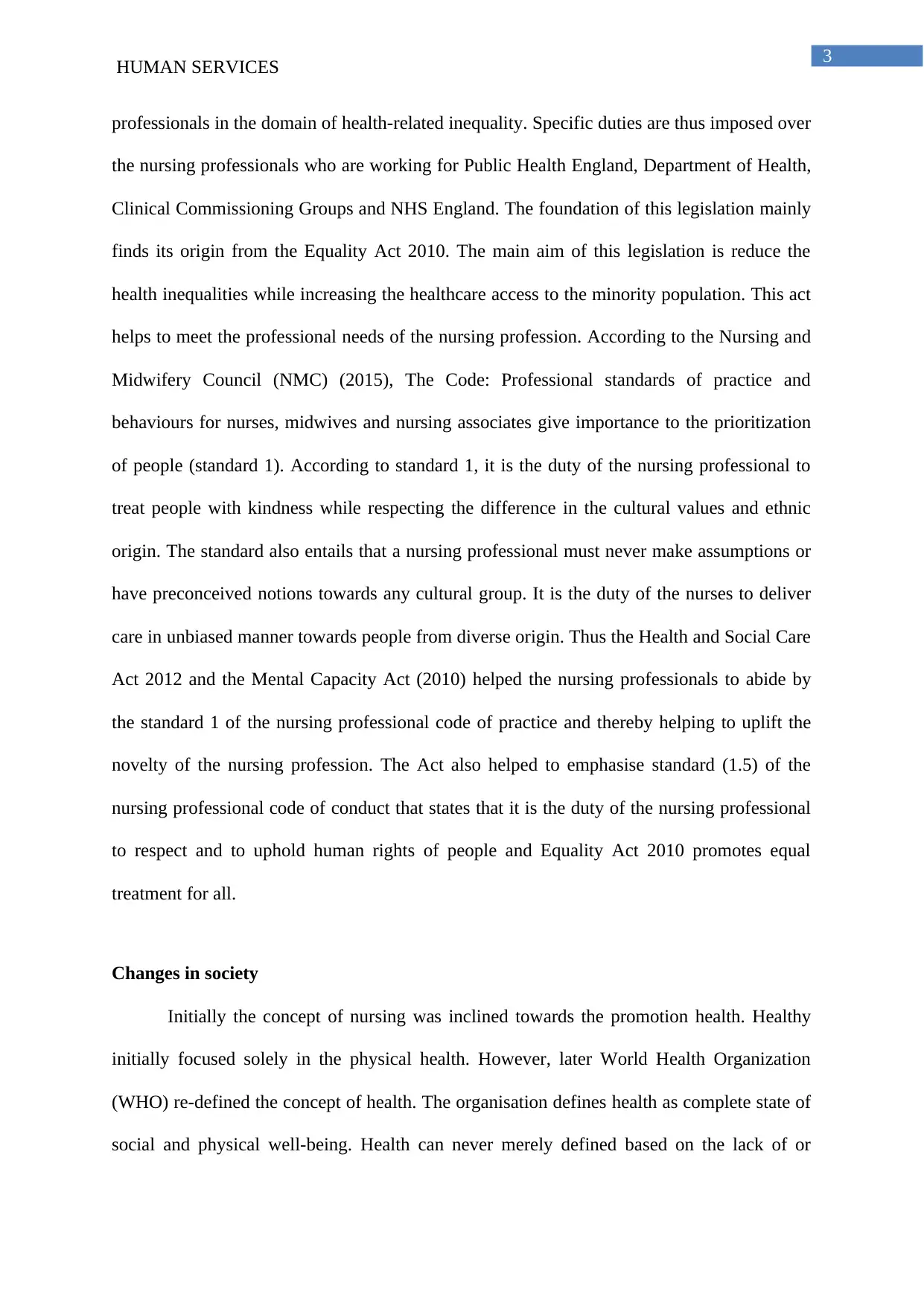
3
HUMAN SERVICES
professionals in the domain of health-related inequality. Specific duties are thus imposed over
the nursing professionals who are working for Public Health England, Department of Health,
Clinical Commissioning Groups and NHS England. The foundation of this legislation mainly
finds its origin from the Equality Act 2010. The main aim of this legislation is reduce the
health inequalities while increasing the healthcare access to the minority population. This act
helps to meet the professional needs of the nursing profession. According to the Nursing and
Midwifery Council (NMC) (2015), The Code: Professional standards of practice and
behaviours for nurses, midwives and nursing associates give importance to the prioritization
of people (standard 1). According to standard 1, it is the duty of the nursing professional to
treat people with kindness while respecting the difference in the cultural values and ethnic
origin. The standard also entails that a nursing professional must never make assumptions or
have preconceived notions towards any cultural group. It is the duty of the nurses to deliver
care in unbiased manner towards people from diverse origin. Thus the Health and Social Care
Act 2012 and the Mental Capacity Act (2010) helped the nursing professionals to abide by
the standard 1 of the nursing professional code of practice and thereby helping to uplift the
novelty of the nursing profession. The Act also helped to emphasise standard (1.5) of the
nursing professional code of conduct that states that it is the duty of the nursing professional
to respect and to uphold human rights of people and Equality Act 2010 promotes equal
treatment for all.
Changes in society
Initially the concept of nursing was inclined towards the promotion health. Healthy
initially focused solely in the physical health. However, later World Health Organization
(WHO) re-defined the concept of health. The organisation defines health as complete state of
social and physical well-being. Health can never merely defined based on the lack of or
HUMAN SERVICES
professionals in the domain of health-related inequality. Specific duties are thus imposed over
the nursing professionals who are working for Public Health England, Department of Health,
Clinical Commissioning Groups and NHS England. The foundation of this legislation mainly
finds its origin from the Equality Act 2010. The main aim of this legislation is reduce the
health inequalities while increasing the healthcare access to the minority population. This act
helps to meet the professional needs of the nursing profession. According to the Nursing and
Midwifery Council (NMC) (2015), The Code: Professional standards of practice and
behaviours for nurses, midwives and nursing associates give importance to the prioritization
of people (standard 1). According to standard 1, it is the duty of the nursing professional to
treat people with kindness while respecting the difference in the cultural values and ethnic
origin. The standard also entails that a nursing professional must never make assumptions or
have preconceived notions towards any cultural group. It is the duty of the nurses to deliver
care in unbiased manner towards people from diverse origin. Thus the Health and Social Care
Act 2012 and the Mental Capacity Act (2010) helped the nursing professionals to abide by
the standard 1 of the nursing professional code of practice and thereby helping to uplift the
novelty of the nursing profession. The Act also helped to emphasise standard (1.5) of the
nursing professional code of conduct that states that it is the duty of the nursing professional
to respect and to uphold human rights of people and Equality Act 2010 promotes equal
treatment for all.
Changes in society
Initially the concept of nursing was inclined towards the promotion health. Healthy
initially focused solely in the physical health. However, later World Health Organization
(WHO) re-defined the concept of health. The organisation defines health as complete state of
social and physical well-being. Health can never merely defined based on the lack of or
Paraphrase This Document
Need a fresh take? Get an instant paraphrase of this document with our AI Paraphraser
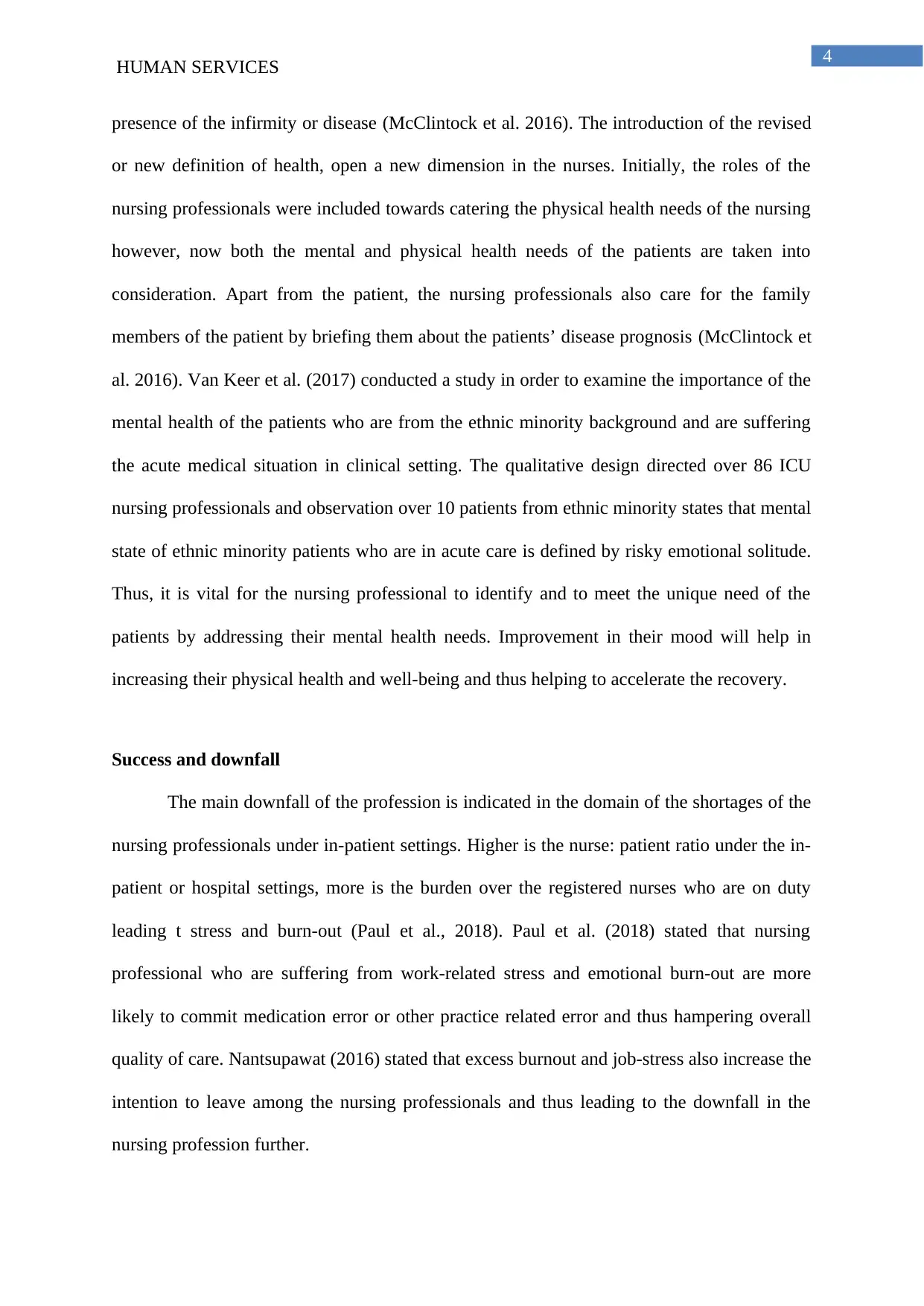
4
HUMAN SERVICES
presence of the infirmity or disease (McClintock et al. 2016). The introduction of the revised
or new definition of health, open a new dimension in the nurses. Initially, the roles of the
nursing professionals were included towards catering the physical health needs of the nursing
however, now both the mental and physical health needs of the patients are taken into
consideration. Apart from the patient, the nursing professionals also care for the family
members of the patient by briefing them about the patients’ disease prognosis (McClintock et
al. 2016). Van Keer et al. (2017) conducted a study in order to examine the importance of the
mental health of the patients who are from the ethnic minority background and are suffering
the acute medical situation in clinical setting. The qualitative design directed over 86 ICU
nursing professionals and observation over 10 patients from ethnic minority states that mental
state of ethnic minority patients who are in acute care is defined by risky emotional solitude.
Thus, it is vital for the nursing professional to identify and to meet the unique need of the
patients by addressing their mental health needs. Improvement in their mood will help in
increasing their physical health and well-being and thus helping to accelerate the recovery.
Success and downfall
The main downfall of the profession is indicated in the domain of the shortages of the
nursing professionals under in-patient settings. Higher is the nurse: patient ratio under the in-
patient or hospital settings, more is the burden over the registered nurses who are on duty
leading t stress and burn-out (Paul et al., 2018). Paul et al. (2018) stated that nursing
professional who are suffering from work-related stress and emotional burn-out are more
likely to commit medication error or other practice related error and thus hampering overall
quality of care. Nantsupawat (2016) stated that excess burnout and job-stress also increase the
intention to leave among the nursing professionals and thus leading to the downfall in the
nursing profession further.
HUMAN SERVICES
presence of the infirmity or disease (McClintock et al. 2016). The introduction of the revised
or new definition of health, open a new dimension in the nurses. Initially, the roles of the
nursing professionals were included towards catering the physical health needs of the nursing
however, now both the mental and physical health needs of the patients are taken into
consideration. Apart from the patient, the nursing professionals also care for the family
members of the patient by briefing them about the patients’ disease prognosis (McClintock et
al. 2016). Van Keer et al. (2017) conducted a study in order to examine the importance of the
mental health of the patients who are from the ethnic minority background and are suffering
the acute medical situation in clinical setting. The qualitative design directed over 86 ICU
nursing professionals and observation over 10 patients from ethnic minority states that mental
state of ethnic minority patients who are in acute care is defined by risky emotional solitude.
Thus, it is vital for the nursing professional to identify and to meet the unique need of the
patients by addressing their mental health needs. Improvement in their mood will help in
increasing their physical health and well-being and thus helping to accelerate the recovery.
Success and downfall
The main downfall of the profession is indicated in the domain of the shortages of the
nursing professionals under in-patient settings. Higher is the nurse: patient ratio under the in-
patient or hospital settings, more is the burden over the registered nurses who are on duty
leading t stress and burn-out (Paul et al., 2018). Paul et al. (2018) stated that nursing
professional who are suffering from work-related stress and emotional burn-out are more
likely to commit medication error or other practice related error and thus hampering overall
quality of care. Nantsupawat (2016) stated that excess burnout and job-stress also increase the
intention to leave among the nursing professionals and thus leading to the downfall in the
nursing profession further.
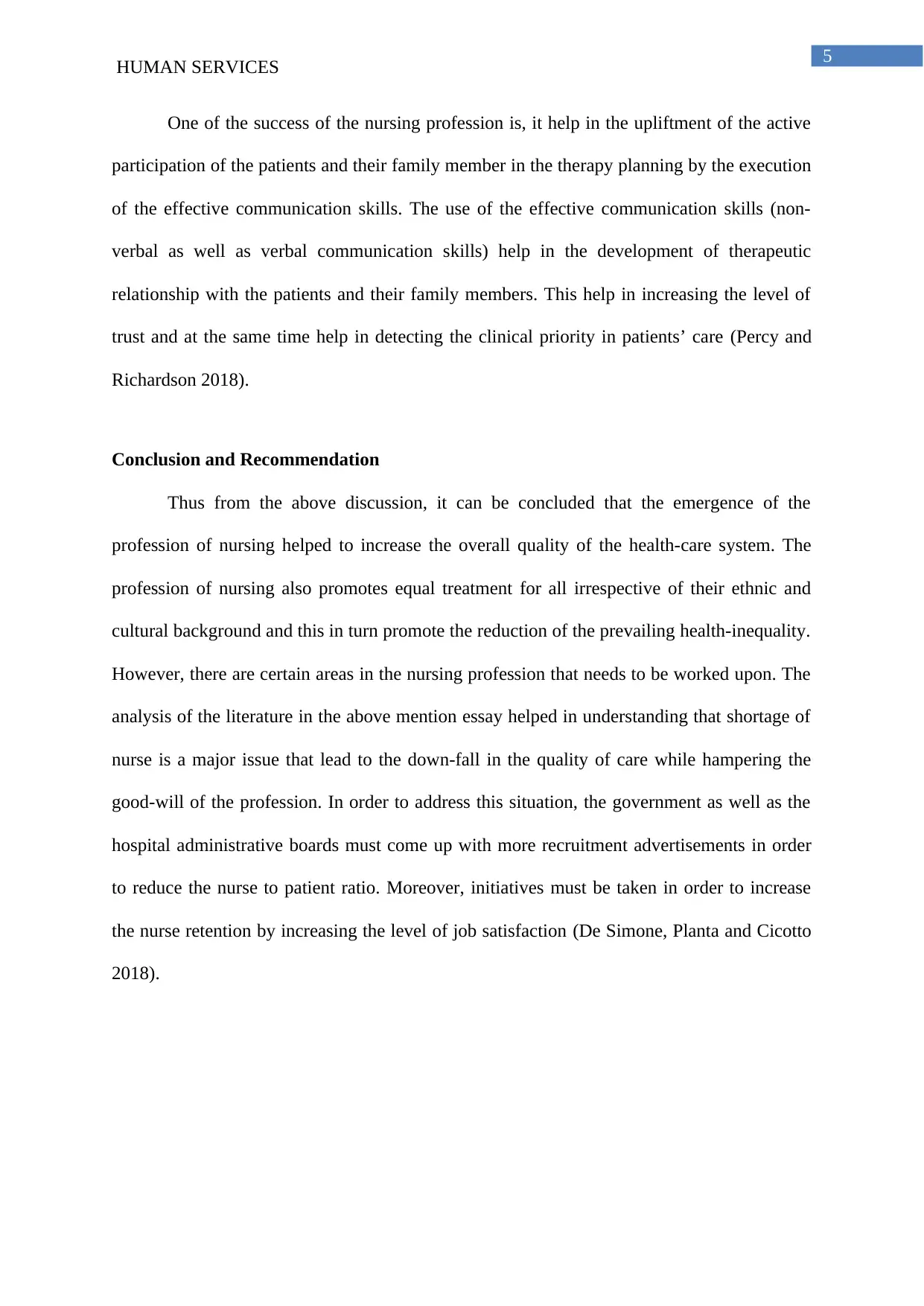
5
HUMAN SERVICES
One of the success of the nursing profession is, it help in the upliftment of the active
participation of the patients and their family member in the therapy planning by the execution
of the effective communication skills. The use of the effective communication skills (non-
verbal as well as verbal communication skills) help in the development of therapeutic
relationship with the patients and their family members. This help in increasing the level of
trust and at the same time help in detecting the clinical priority in patients’ care (Percy and
Richardson 2018).
Conclusion and Recommendation
Thus from the above discussion, it can be concluded that the emergence of the
profession of nursing helped to increase the overall quality of the health-care system. The
profession of nursing also promotes equal treatment for all irrespective of their ethnic and
cultural background and this in turn promote the reduction of the prevailing health-inequality.
However, there are certain areas in the nursing profession that needs to be worked upon. The
analysis of the literature in the above mention essay helped in understanding that shortage of
nurse is a major issue that lead to the down-fall in the quality of care while hampering the
good-will of the profession. In order to address this situation, the government as well as the
hospital administrative boards must come up with more recruitment advertisements in order
to reduce the nurse to patient ratio. Moreover, initiatives must be taken in order to increase
the nurse retention by increasing the level of job satisfaction (De Simone, Planta and Cicotto
2018).
HUMAN SERVICES
One of the success of the nursing profession is, it help in the upliftment of the active
participation of the patients and their family member in the therapy planning by the execution
of the effective communication skills. The use of the effective communication skills (non-
verbal as well as verbal communication skills) help in the development of therapeutic
relationship with the patients and their family members. This help in increasing the level of
trust and at the same time help in detecting the clinical priority in patients’ care (Percy and
Richardson 2018).
Conclusion and Recommendation
Thus from the above discussion, it can be concluded that the emergence of the
profession of nursing helped to increase the overall quality of the health-care system. The
profession of nursing also promotes equal treatment for all irrespective of their ethnic and
cultural background and this in turn promote the reduction of the prevailing health-inequality.
However, there are certain areas in the nursing profession that needs to be worked upon. The
analysis of the literature in the above mention essay helped in understanding that shortage of
nurse is a major issue that lead to the down-fall in the quality of care while hampering the
good-will of the profession. In order to address this situation, the government as well as the
hospital administrative boards must come up with more recruitment advertisements in order
to reduce the nurse to patient ratio. Moreover, initiatives must be taken in order to increase
the nurse retention by increasing the level of job satisfaction (De Simone, Planta and Cicotto
2018).
⊘ This is a preview!⊘
Do you want full access?
Subscribe today to unlock all pages.

Trusted by 1+ million students worldwide
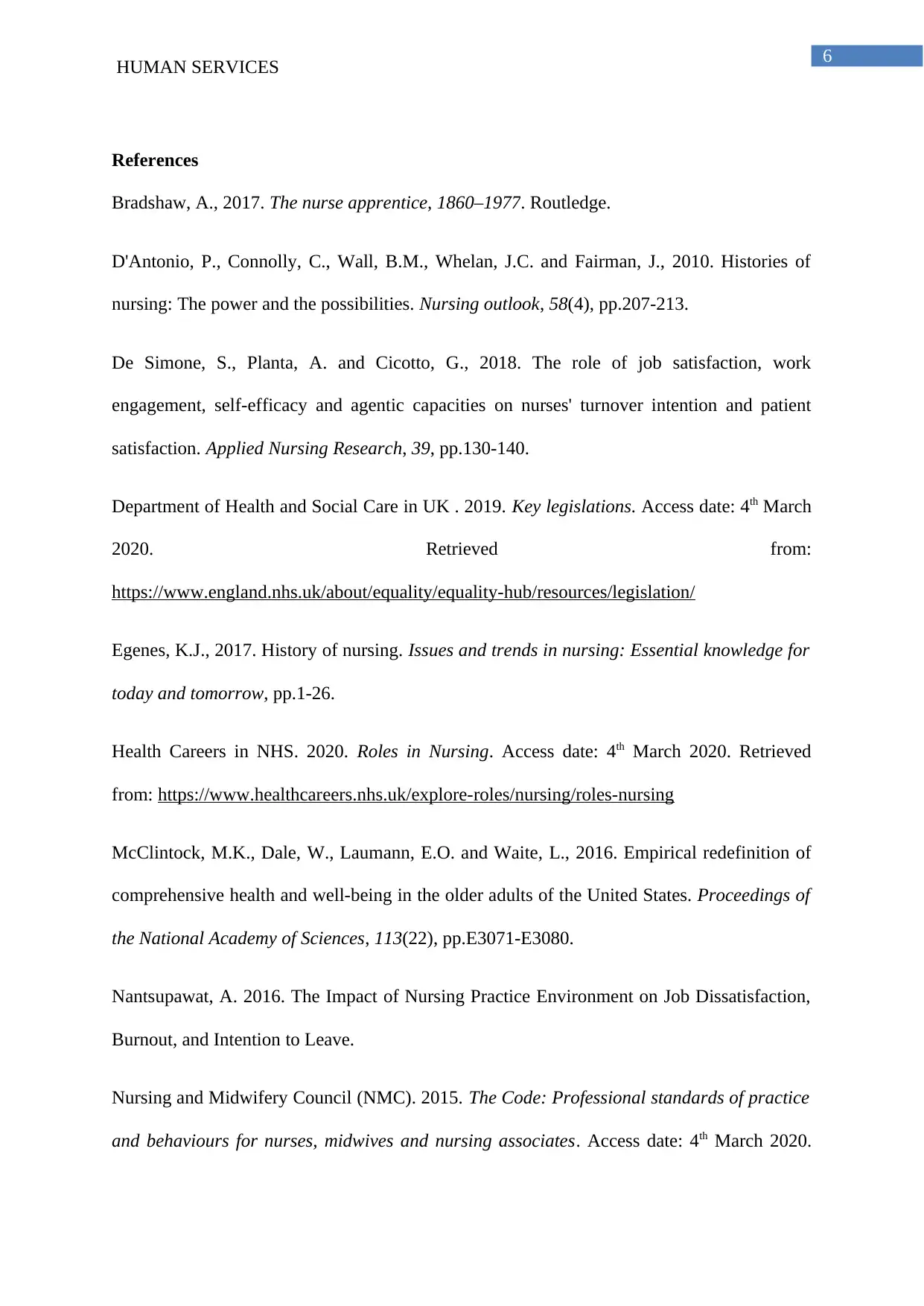
6
HUMAN SERVICES
References
Bradshaw, A., 2017. The nurse apprentice, 1860–1977. Routledge.
D'Antonio, P., Connolly, C., Wall, B.M., Whelan, J.C. and Fairman, J., 2010. Histories of
nursing: The power and the possibilities. Nursing outlook, 58(4), pp.207-213.
De Simone, S., Planta, A. and Cicotto, G., 2018. The role of job satisfaction, work
engagement, self-efficacy and agentic capacities on nurses' turnover intention and patient
satisfaction. Applied Nursing Research, 39, pp.130-140.
Department of Health and Social Care in UK . 2019. Key legislations. Access date: 4th March
2020. Retrieved from:
https://www.england.nhs.uk/about/equality/equality-hub/resources/legislation/
Egenes, K.J., 2017. History of nursing. Issues and trends in nursing: Essential knowledge for
today and tomorrow, pp.1-26.
Health Careers in NHS. 2020. Roles in Nursing. Access date: 4th March 2020. Retrieved
from: https://www.healthcareers.nhs.uk/explore-roles/nursing/roles-nursing
McClintock, M.K., Dale, W., Laumann, E.O. and Waite, L., 2016. Empirical redefinition of
comprehensive health and well-being in the older adults of the United States. Proceedings of
the National Academy of Sciences, 113(22), pp.E3071-E3080.
Nantsupawat, A. 2016. The Impact of Nursing Practice Environment on Job Dissatisfaction,
Burnout, and Intention to Leave.
Nursing and Midwifery Council (NMC). 2015. The Code: Professional standards of practice
and behaviours for nurses, midwives and nursing associates. Access date: 4th March 2020.
HUMAN SERVICES
References
Bradshaw, A., 2017. The nurse apprentice, 1860–1977. Routledge.
D'Antonio, P., Connolly, C., Wall, B.M., Whelan, J.C. and Fairman, J., 2010. Histories of
nursing: The power and the possibilities. Nursing outlook, 58(4), pp.207-213.
De Simone, S., Planta, A. and Cicotto, G., 2018. The role of job satisfaction, work
engagement, self-efficacy and agentic capacities on nurses' turnover intention and patient
satisfaction. Applied Nursing Research, 39, pp.130-140.
Department of Health and Social Care in UK . 2019. Key legislations. Access date: 4th March
2020. Retrieved from:
https://www.england.nhs.uk/about/equality/equality-hub/resources/legislation/
Egenes, K.J., 2017. History of nursing. Issues and trends in nursing: Essential knowledge for
today and tomorrow, pp.1-26.
Health Careers in NHS. 2020. Roles in Nursing. Access date: 4th March 2020. Retrieved
from: https://www.healthcareers.nhs.uk/explore-roles/nursing/roles-nursing
McClintock, M.K., Dale, W., Laumann, E.O. and Waite, L., 2016. Empirical redefinition of
comprehensive health and well-being in the older adults of the United States. Proceedings of
the National Academy of Sciences, 113(22), pp.E3071-E3080.
Nantsupawat, A. 2016. The Impact of Nursing Practice Environment on Job Dissatisfaction,
Burnout, and Intention to Leave.
Nursing and Midwifery Council (NMC). 2015. The Code: Professional standards of practice
and behaviours for nurses, midwives and nursing associates. Access date: 4th March 2020.
Paraphrase This Document
Need a fresh take? Get an instant paraphrase of this document with our AI Paraphraser
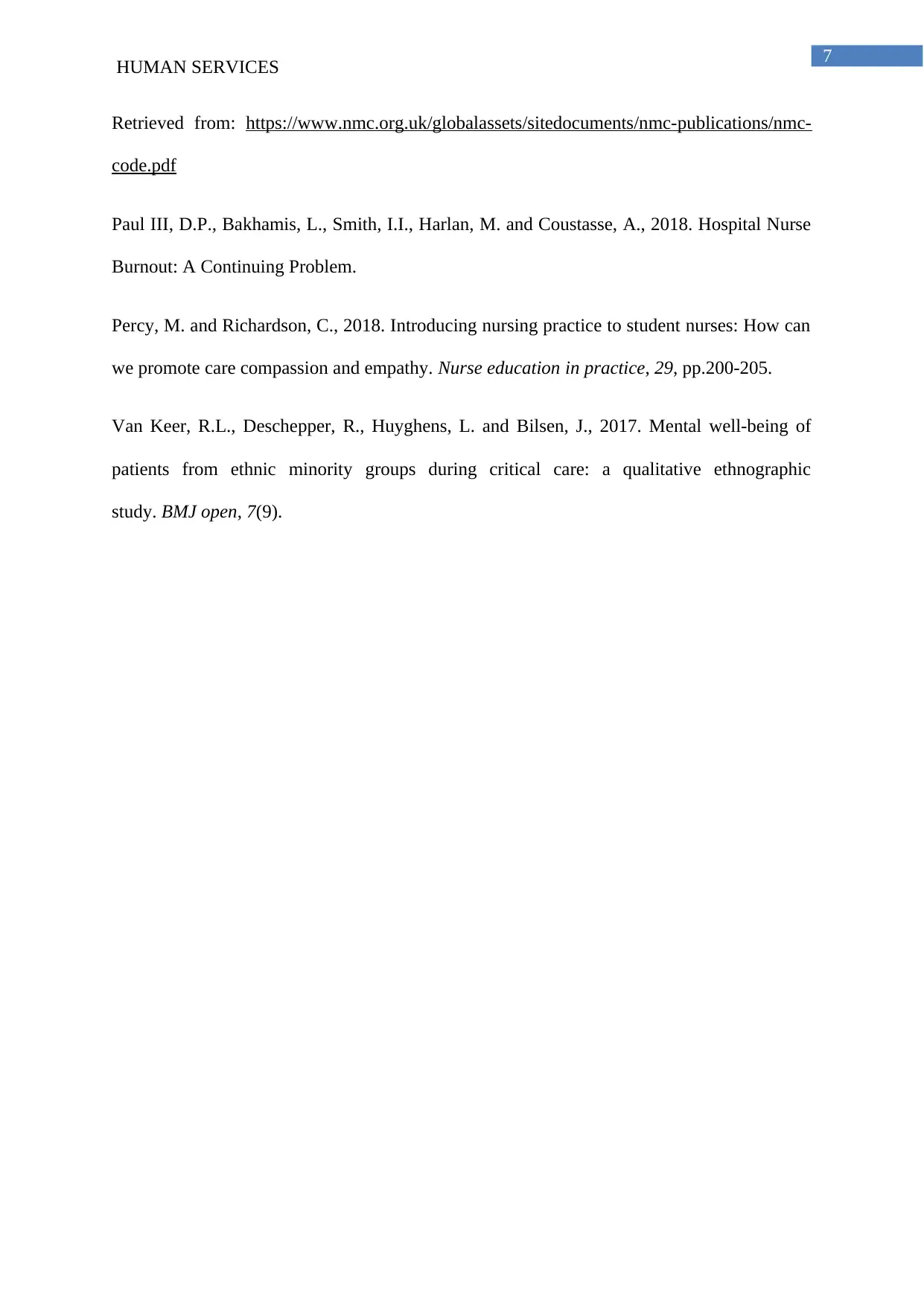
7
HUMAN SERVICES
Retrieved from: https://www.nmc.org.uk/globalassets/sitedocuments/nmc-publications/nmc-
code.pdf
Paul III, D.P., Bakhamis, L., Smith, I.I., Harlan, M. and Coustasse, A., 2018. Hospital Nurse
Burnout: A Continuing Problem.
Percy, M. and Richardson, C., 2018. Introducing nursing practice to student nurses: How can
we promote care compassion and empathy. Nurse education in practice, 29, pp.200-205.
Van Keer, R.L., Deschepper, R., Huyghens, L. and Bilsen, J., 2017. Mental well-being of
patients from ethnic minority groups during critical care: a qualitative ethnographic
study. BMJ open, 7(9).
HUMAN SERVICES
Retrieved from: https://www.nmc.org.uk/globalassets/sitedocuments/nmc-publications/nmc-
code.pdf
Paul III, D.P., Bakhamis, L., Smith, I.I., Harlan, M. and Coustasse, A., 2018. Hospital Nurse
Burnout: A Continuing Problem.
Percy, M. and Richardson, C., 2018. Introducing nursing practice to student nurses: How can
we promote care compassion and empathy. Nurse education in practice, 29, pp.200-205.
Van Keer, R.L., Deschepper, R., Huyghens, L. and Bilsen, J., 2017. Mental well-being of
patients from ethnic minority groups during critical care: a qualitative ethnographic
study. BMJ open, 7(9).
1 out of 8
Related Documents
Your All-in-One AI-Powered Toolkit for Academic Success.
+13062052269
info@desklib.com
Available 24*7 on WhatsApp / Email
![[object Object]](/_next/static/media/star-bottom.7253800d.svg)
Unlock your academic potential
Copyright © 2020–2026 A2Z Services. All Rights Reserved. Developed and managed by ZUCOL.





